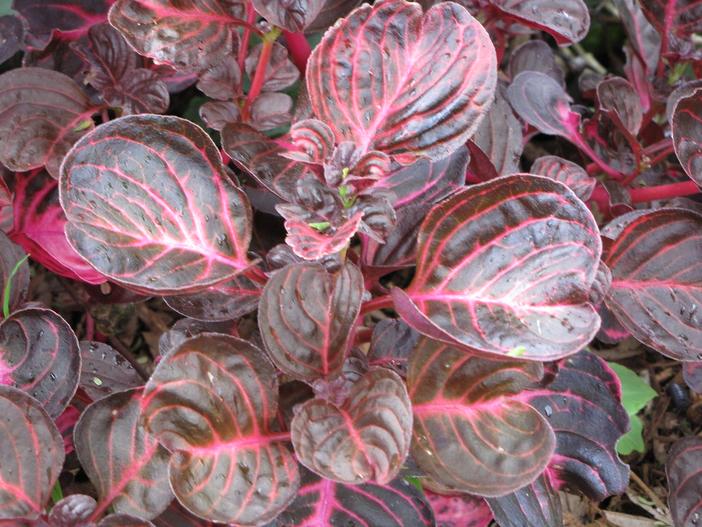Herbst’s Bloodleaf
(Iresine herbstii)
Herbst’s Bloodleaf (Iresine herbstii)
/
/

Forest and Kim Starr
CC BY 2.0
Image By:
Forest and Kim Starr
Recorded By:
Copyright:
CC BY 2.0
Copyright Notice:
Photo by: Forest and Kim Starr | License Type: CC BY 2.0 | License URL: https://creativecommons.org/licenses/by/2.0/ | Uploader: Starr Environmental | Publisher: Flickr
























Estimated Native Range
Summary
Iresine herbstii, commonly known as Herbst’s Bloodleaf, is an evergreen perennial herb, although often grown as an annual, and is native to the open woodlands and forest edges of Brazil and other parts of South America. It typically reaches a height of 2-5 feet (0.6-1.5 meters) and a spread of 1-3 feet (0.3-0.9 meters). Herbst’s Bloodleaf is characterized by its striking foliage, which is usually a vibrant red or burgundy, making it a popular ornamental plant. The leaves are ovate to lanceolate with a glossy texture, and although it does flower, the small white or greenish flowers are not particularly showy compared to the foliage.
Herbst’s Bloodleaf is valued for its colorful leaves, which can add a bold accent to garden beds, borders, and containers. It is relatively easy to maintain and can be used effectively as a ground cover or in mass plantings for a dramatic effect. In cultivation, it prefers a location with full sun to part shade, consistent moisture, and well-drained soil. It is not drought-tolerant and may require additional water during dry periods. While generally pest-free, it can be susceptible to mealybugs and spider mites, especially when grown indoors or in greenhouse conditions. Herbst’s Bloodleaf is not known for aggressive roots or significant disease problems, but it can be sensitive to cold temperatures and should be protected from frost.CC BY-SA 4.0
Herbst’s Bloodleaf is valued for its colorful leaves, which can add a bold accent to garden beds, borders, and containers. It is relatively easy to maintain and can be used effectively as a ground cover or in mass plantings for a dramatic effect. In cultivation, it prefers a location with full sun to part shade, consistent moisture, and well-drained soil. It is not drought-tolerant and may require additional water during dry periods. While generally pest-free, it can be susceptible to mealybugs and spider mites, especially when grown indoors or in greenhouse conditions. Herbst’s Bloodleaf is not known for aggressive roots or significant disease problems, but it can be sensitive to cold temperatures and should be protected from frost.CC BY-SA 4.0
Plant Description
- Plant Type: Herb
- Height: 2-5 feet
- Width: 1-3 feet
- Growth Rate: Moderate
- Flower Color: N/A
- Flowering Season: Summer
- Leaf Retention:
Growth Requirements
- Sun: Full Sun, Part Shade
- Water: Medium
- Drainage: Medium
Common Uses
Border Plant, Groundcover, Low Maintenance, Potted Plant
Natural Habitat
Native to the open woodlands and forest edges of Brazil and other parts of South America
Other Names
Common Names: Herbst’s Bloodleaf , Bloodleaf , Beefsteak Plant
Scientific Names: Iresine herbstii , Iresine wallisii , Achyranthes verschaffeltii , Iresine diffusa f. herbstii , Iresine verschaffeltii , Achyranthes biemuelleri , Achyranthes herbstii , Iresine biemuelleri , Iresine hoveyi , Iresine reticulata
GBIF Accepted Name: Iresine diffusa f. herbstii (Hook.) Pedersen